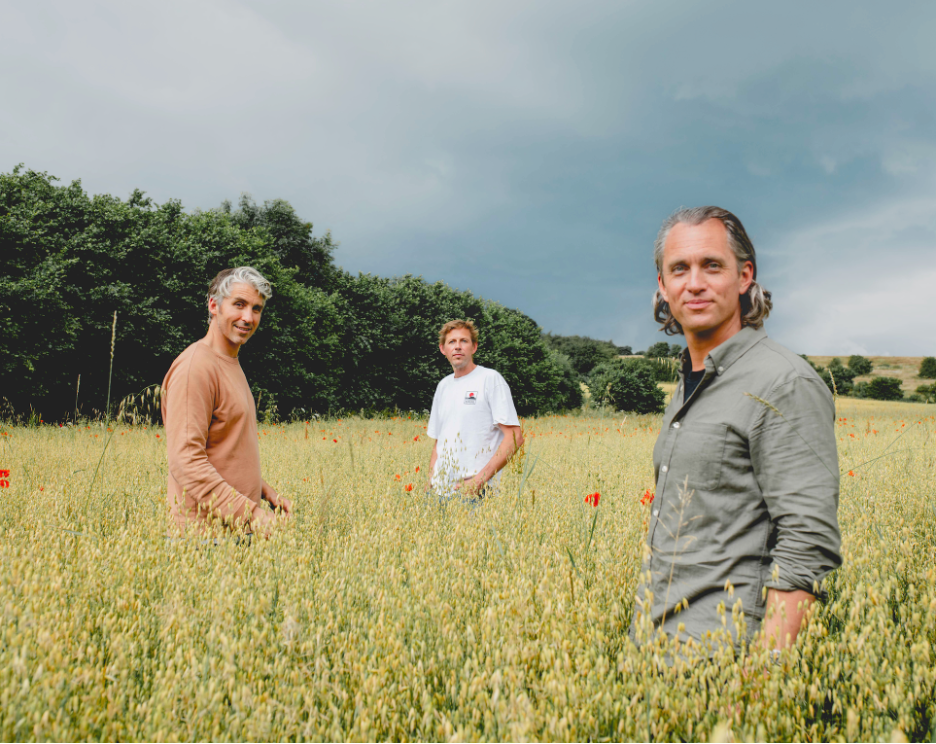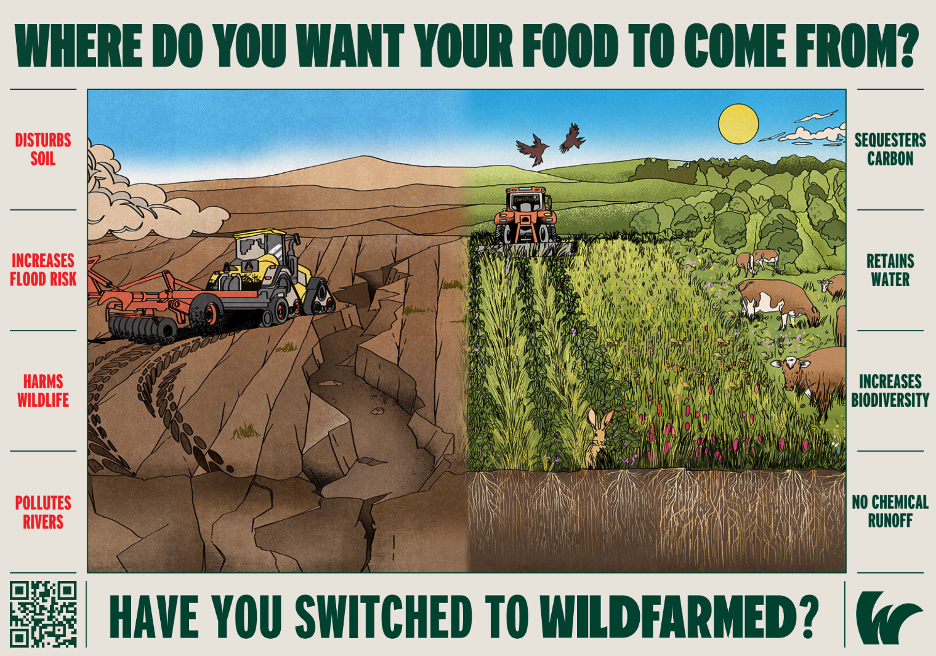Enormous challenges often take radical solutions… and sometimes come from the most unexpected people.
Twenty years ago, Andy Cato was enjoying great success as half of the music duo Groove Armada, George Lamb had a busy career as a VJ and TV presenter, and Edd Lees was deep in a career in financial markets and investments. But in 2006, after reading an article on industrial food production, Andy Cato’s life was changed… and along with it the career paths of all three gentlemen would also change.
Andy became fully enveloped in the food production system and in how he could make a difference by doing farming the unconventional way. Eventually, he even sold his publishing rights to Groove Armada to buy a 100-hectare farm in France.
As Andy immersed himself in farming ecologically, George Lamb – a big Groove Armada fan – was increasingly feeling less and less fulfilled by his work in entertainment. When the two met in 2013, Andy shared the farming journey he had been on and invited George to visit the farm. Seeing Andy’s work in person deeply resonated with George and the two decided to join forces, along with George’s friend Edd Lees.
Edd – who at the time was co-head of Sunrise Brokers – was inspired by Andy’s work and offered to not just lend Andy money for a new flour mill, but also left his corporate finance career to co-found Wildfarmed with Andy and George.
You can read the entire Wildfarmed origins story here.

Wildfarmed is Andy, George and Edd’s answer to the enormous challenge of a broken, degenerative, industrial food system. It is a fully integrated farming and food business that works with a community of farmers who grow (mostly) wheat to Wildfarmed’s specific Wildfarmed Standards. They arrange for purchase of this product at a premium, and sell flour and bakery products. Their core competency is connecting growers, food businesses and consumers in regenerative farming through engaging storytelling.
RFSI had the chance to talk to Wildfarmed co-founder Edd Lees about what makes Wildfarmed so unique, the journey so far, and what comes next. Here is what he shared:
What prompted you to start Wildfarmed?
Andy Cato, who is one of the other co-founders of Wildfarmed. His story is well-documented, and well worth a Google! But what prompted me to start Wildfarmed, was the opportunity financially and environmentally to run a business where purpose and profit are completely intertwined. I recently read in the Financial Times (FT) that the environmental costs of the existing food systems are $3 trillion a year and the additional costs to health were at least $11 trillion. If we can find a solution to redress that in a similar way, then that creates a great opportunity.
What problem are you solving for?
Generally speaking, people don’t really know where their food comes from and how it is grown – so we’re solving that problem by creating our own set of Wildfarmed Regenerative Standards that enable transition by working with farmers at one end of the supply chain to educating consumers at the other end. Our message is empowering: biodiversity, health, and climate crises can be addressed through food choices, we’re taking it from chemically intensive agriculture to one built on nature and biology.

How are consumers responding to your content product and message?
Wildfarmed is about affecting landscape change through our innovative regenerative supply chain and engaging marketing. We hear that customers enjoy being part of a culturally relevant movement through their food choices. Sustainability shouldn’t be drab and negative.
How do you characterize the impact of your work?
Wildfarmed is all about landscape change. The impact of our work is measured in the number of hectares or acres that we’re transforming into the Wildfarmed system every year, on a more granular level, the number of people eating Wildfarmed food.
Have you raised external capital?
Since 2020 we’ve closed three rounds of funding from friends because family hasn’t been much use in this regard! We’re currently closing our, what would be called, Series A – but I have an aversion to using tech-like terms for investment in regenerative food businesses such as ours.
What’s the biggest challenge you have faced on your fund-raising journey?
The biggest challenge is that regenerative agriculture and regenerative food isn’t very well known. It’s got too many syllables to catch on for starters. If the sector could attract a fraction of the catalytic funding of clean energy or electric cars, that would be a great start, but we just haven’t got that framework built for it today. Equally investors like well-trodden roads; the big brands of tomorrow are currently being built. So when I’m going around telling a story and raising money for Wildfarmed, there aren’t at the moment enough comparable businesses to get investors to feel comfortable to say “that one’s like another one”, but at the same time that presents an opportunity for a company like Wildfarmed to be the first.
Given the challenges you describe about investors comfort with regenerative, if you were able to tell all investors looking at this space one thing, what would it be?
Our message: regenerative agriculture, when executed well, really is a silver bullet for the health of people and the planet. If it receives a fraction of the investment of clean energy or electric cars, it will deliver generational returns.
What are your next steps as an organization?
We have established a B2B2C model, which means we sell ingredients to our customers through co-branded opportunities. They’re proud to say that their products are made with Wildfarmed and at the same time, that’s allowed us to engage a consumer following significantly greater than an ingredients business of our size. The plan from the beginning was always to become a fully consumer facing brand, which starts in May 2024 in the UK. I believe Wildfarmed is a brand that can have truly global reach.
What’s the most important lesson you have learned on your journey so far?
The most important lesson learned on the journey so far is collaboration. This means having the best team internally to make things happen as effectively as possible, and then externally collaborating and supporting others where possible. This is not a zero sum opportunity. We are literally all on the same side, even if we get stuck in our own challenges each day. This is truly a ‘rising tides raises all ships’ situation and we should all work together.
Edd, Andy and George will be at RFSI Europe on 28-29 February in Brussels. Join us to hear the story of how they built a regenerative wheat supply chain and how they think they can scale this model.
Sarah Day Levesque is Managing Director at RFSI & Editor of RFSI News. She can be reached here.
